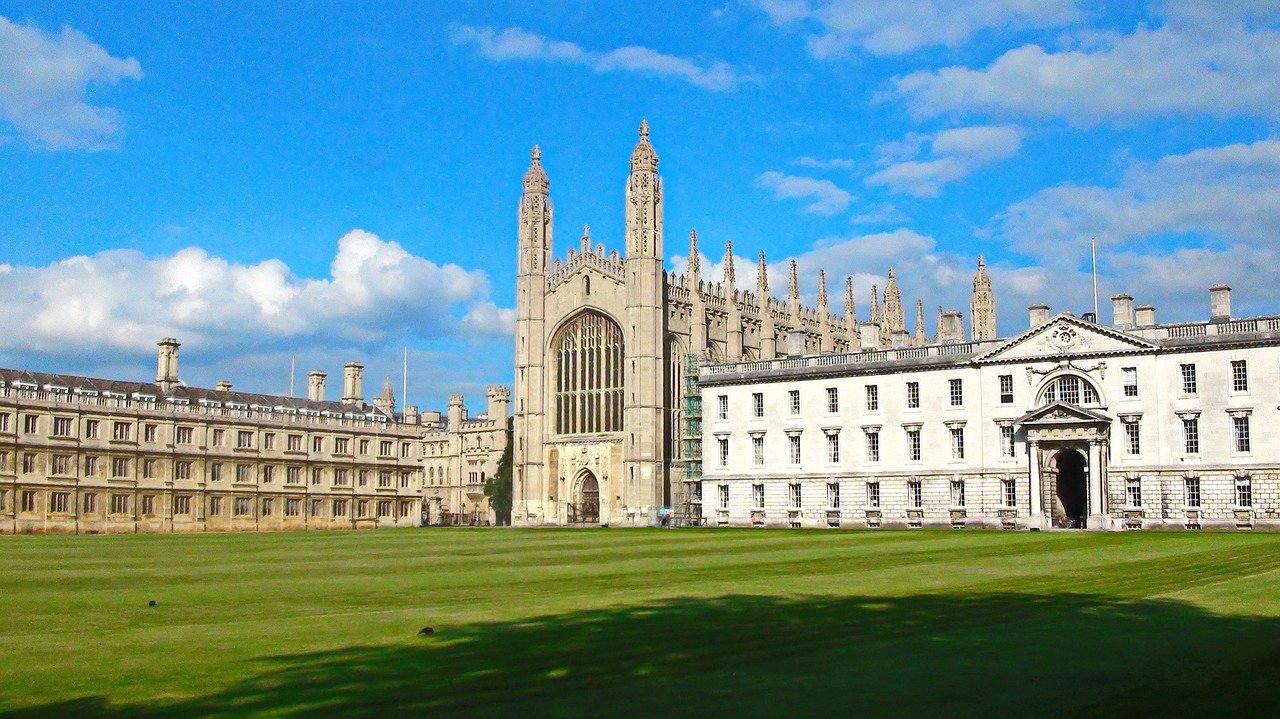Oxford and Cambridge
Oxbridge (Oxford and Cambridge) Applications
The process for applying to Oxford and Cambridge is very similar to the process for applying to other UK universities, with a few key differences. Applications to Oxford and Cambridge are done through UCAS, but with an early deadline in mid October. As one of their five UCAS choices, applicants can apply to either Oxford or Cambridge, but not both. Unlike other universities, applications are made to a specific college within the university, although applicants also have the option of submitting an ‘open’ application, in which case the university allocates the applicant to a college depending on how many applicants each college has had.
Oxford and Cambridge one-to-one interview preparation - for all subjects

[NEW] 3-hour Interview package Interviews for Oxbridge (Oxford, Cambridge) are approaching! This is your chance to impress admission officers with more than just your academic record - it is all about excelling in the interviews. CANA provides a 3-hour Interview package, suitable for both Oxford and Cambridge applicants and UK/HK Medicine applicants.
Our experienced education consultants who are familiar with the expectations of the interviews (Oxford, Cambridge, MMI, Panel interviews) are dedicated to helping you succeed. Boost your preparation now with interview coaching from CANA Oxford and Cambridge consultants!
Subjects available include:
Anthropology, Archaeology, Biology, Biochemistry, Biomedical Sciences, Chemistry, Computer Science, Economics, Economics and Management, Engineering, English, Geography, History, Law, Land Economy, Mathematics, Medicine, Natural Sciences, Physics, Philosophy, Politics, PPE, Psychology, Veterinary Medicine and more.
Updates for the UK Personal Statement
For the 2026 Entry (applicants apply to start University in 2026), the UCAS Personal Statement will change from one longer piece of text to three separate questions. At Cana, we keep track of the latest changes and updates related to UCAS. Come discuss with us to plan ahead for the Personal Statement!
Changes in Cambridge Assessment Admissions Testing (CAAT) (2025 Entry)
The BMAT, NSAA, and ENGAA tests will be discontinued starting in 2024 (for applicants applying to start University in 2025).
The NSAA and ENGAA tests will be replaced by a new test, the Engineering and Science Admissions Test (ESAT). Meanwhile, multiple BMAT universities have already confirmed moving to the UCAT test, while others are to be updated. Check the university websites regularly for the latest updates.
Should I apply to Oxford or Cambridge?
There are a number of factors to consider when deciding which of Oxford and Cambridge to apply to.
1. The course that you’d like to apply to
The courses at each university are different. For example, only Oxford offers Philosophy, Politics, and Economics (PPE), whereas the closest equivalent at Cambridge is Human, Social, and Political Sciences (HSPS). Economics itself is also studied differently at the two Universities; Oxford offers Economics only as part of a joint honours degree (PPE or Economics and Management), whereas Cambridge offers Economics on its own.
Another key difference is the science courses; Cambridge offers a flexible natural science course within which you can select purely biological sciences, purely physical sciences or a combination of both, according to your interests and background. A broad first year is combined with increasing specialisation in the second year, and the possibility of total specialisation in the third year. Whilst students are not expected to declare their final specialty at the time of application, they would generally indicate their preference to either biological or physical sciences in their personal statement which may steer the scope of their interview. Oxford, on the other hand, offers each science subject separately.
Even when the subject is similar, the course content and the entrance test requirements at each university will differ, so be sure to examine each individual course in detail.
2.The course ranking at Oxbridge
The universities might have different rankings for the particular subject area that you are interested in. For example, Oxford is ranked above Cambridge for Politics, but below it for Computer Science.
3.The strengths of your application on admissions tests vs. interviews
It is worth considering how each university uses the admissions test as part of your application. Oxford interviews significantly fewer applicants per place than Cambridge, because it largely uses admissions tests to select which candidates to invite for an interview. Therefore, if you feel that you are likely to perform very well on an admissions test, your chance of being invited for an interview at Oxford, and therefore your chance of being offered a place, will be significantly higher. However, if you feel more confident about the interview than about the admissions test, you should apply to Cambridge as your chance of being offered an interview in which you can really show off your skills will be higher.
4. Success rate of each course
You might also want to consider the historical success rate for your course at each University. Courses vary significantly in terms of how competitive they are. For example, Classics at Oxford tended to be less competitive compared to Economics and Management. Statistics for course success rate are available at the following links:
Cambridge success rate: https://www.undergraduate.study.cam.ac.uk/apply/statistics
Oxford success rate: https://www.ox.ac.uk/about/facts-and-figures/admissions-statistics/undergraduate-students
5. Personal preference of the school location
The feel of the two cities is different. Oxford is a much larger city than Cambridge, and has a livelier nightlife, and more museums, galleries, and shops.
6. Difference in admissions test for similar disciplines
The structure and context of the admissions tests at Oxbridge could differ for similar disciplines.
For example, if you are interested in Biomedical Sciences, you could either apply for Biomedical Sciences at Oxford or Natural Sciences at Cambridge, which requires Biomedical Sciences Admissions Test and ESAT (Engineering and Science Admissions Test), respectively, as an entrance exam.
Another example are Economics applications - If you are applying for Economics at Cambridge, you’d be writing the TMUA (Test of Mathematics for University Admission) paper. If you are applying for Economics and Management at Oxford, you’d be writing the TSA (the Thinking Skills Assessment). TMUA has more Maths components in the test while TSA has more verbal reasoning.
We do advise students to try the various admissions tests and decipher which one that they most excel at before confirming their application to Oxbridge.
How to prepare for an Oxbridge application
It is said that you ‘read’ for an Oxbridge degree (e.g. I am ‘reading’ Chemistry at Cambridge), and the application is no different! The first thing to do when preparing for an Oxbridge application is to ensure that you are reading widely on your chosen subject. This will allow you to develop your understanding in a way that will improve your performance at the interview, as well as helping you to construct ideas for your Personal Statement. Below are the recommended reading lists published by each University, but you should also feel free to explore outside these lists on whatever topics that interest you.
A sample link to the Oxford reading list: https://www.ox.ac.uk/admissions/undergraduate/courses/suggested-subject-resources
A sample link to the Cambridge reading list: https://www.kings.cam.ac.uk/study/undergraduate/reading-lists
Another excellent way to prepare is to enter a variety of essay competitions in your topic area. Several colleges run their own essay competitions.
Essay competitions are a great way to demonstrate your academic interest in a subject and develop your research skills and knowledge beyond your regular school curriculum. They also make excellent content for your Personal Statement and discussion topics for your interview and are proof of your academic abilities.
What is an Oxbridge college?
Oxford and Cambridge are structured differently from most other UK universities. Each of them are made up of a number of constituent colleges, each of which is an academic community with its own grounds, facilities, and accommodation. Although lectures and exams are carried out centrally, much of the rest of the teaching at Oxford and Cambridge happens in colleges. Most colleges offer the majority of subjects available for study at each university, but they vary in terms of size, age, location, and other factors.
Oxford has 39 colleges, ranging from the oldest, University College, founded in 1249, and the newest, Reuben College, founded in 2019. It also has six Permanent Private Halls (PPHs), which are equivalent to colleges but tend to have a religious affiliation. Cambridge has 31 colleges, ranging from Peterhouse College, founded in 1284, to more recent colleges like Robinson.
Not all colleges accept both undergraduate and postgraduate students; for example, Green Templeton College, Oxford, only accepts postgraduate students. Although all Oxford colleges accept both men and women, a few Cambridge colleges, including Newnham College, only accept women; these were established in the 1800s, when women were not allowed to study in other colleges, and they have retained this tradition.
Colleges provide both academic and pastoral support to their students. Oxford tutorials and Cambridge supervisions, both of which are the meetings between tutors and a small group of students which form the basis of the Oxbridge teaching system, are carried out in colleges. Colleges also have libraries which, in addition to the central university libraries, can provide important academic resources to their students. Aside from academics, most students mainly socialise with other students from their college. Colleges all have their own dining Halls, as well as other facilities like a college bar/café, sports grounds like croquet courts and rowing boathouses, and JCRs. The Junior Common Room (JCR) refers to the body of undergraduate students who elect a JCR president and other representatives; most colleges also have a room or set of rooms also called the JCR, which is a social space for students, usually including sofas, televisions, video game consoles, etc. Colleges also organise formal events like dinners and balls. The frequency of formal dinners varies by college, but most colleges hold at least one a week. Formals serve three-course meals at which students are required to wear their academic dress. Fellows sit at a High Table, and grace is traditionally said in Latin at the beginning and end of the meal. Balls range from white-tie Commemoration Balls, held by the oldest colleges like New College (Oxford), to yearly black-tie Balls. Oxford holds balls throughout the year, whereas Cambridge traditionally holds the majority of its balls during May Week, the week after the exam period.
Academic rankings are available for both Oxford and Cambridge colleges.
- The Norrington Table (Oxford) measures the performance of students in finals, and assigns a score to each college based on the proportion of students that attains each degree classification, from 1st through to 3rd. Link: https://www.ox.ac.uk/about/facts-and-figures/undergraduate-degree-classifications
- The Tompkins Table (Cambridge), unlike the Norrington Table, is not an official publication of the University. It is published by Varsity, one of the student newspapers of the University, and is calculated in a similar way to the Norrington Table. Reference link: https://www.varsity.co.uk/news/17736(2019)
How to choose which College to apply to
There are a number of different factors to consider when choosing a College.
- Subject choice
- Location
- Number of students per course
- Success rates
- The Norrington Table/Tompkins Table
- College culture
- Accommodation and catering
- Facilities
- Personal Instinct/ Preference
- Scholarship applications
If you would like to know more about how to choose the Oxbridge college, please contact us for further information.
Remember that choosing a college does not necessarily guarantee that that college will be the one that you end up at. Both Oxford and Cambridge operate a ‘pooling’ system to ensure that the best candidates are offered places, regardless of which college they apply to. For example, if a certain college is oversubscribed with excellent applicants, some of those applicants will be ‘pooled’ to other colleges, either before or after the interview. This means that around 34% of applicants to Oxford in 2020 were accepted by a college that they did not select on their application. At Cambridge, around 1 in 4 applicants are ‘pooled’ at some stage in their application, and around 1 in 5 are accepted by a college that they did not select.
If you are struggling to choose, you can instead submit an open application. This means that your application will be assigned to a college that has had relatively fewer applications for your course.
Remember that the vast majority of students end up loving their college, even if it was not the one that they initially selected for their application.
Should I make an open application or apply to a college?
It is sometimes argued that making an open application may increase your chances of success, as it means that your application will be allocated to a College which has had relatively fewer applications in that year. However, the fact that so many applicants now get ‘pooled’ means that the positive impact of making an open application is diminished. Therefore, it is worth making a College selection, and ensuring that you give yourself a chance of getting into a College that you would really love to attend and that meets your criteria. If you are sufficiently qualified to be offered a place and that College is oversubscribed, you will be allocated to a different College.
How to prepare my Personal Statement
The Personal Statement is an important opportunity to showcase your academic commitment and potential for the subject you want to study. For an Oxbridge application, around 85% of your Personal Statement should be devoted to academics, with the remaining 15% covering your extra-curricular activities (ECAs).
The Personal Statement should demonstrate how you have already engaged with your subject above and beyond your studies at school, and how you have developed your interest in that subject. For example, you could talk about a research project that you undertook, independent reading and study that you have carried out, or essay competitions you have entered.
Tutors are looking for excellent intellectual curiosity and true academic potential, so you should make sure to showcase these qualities in your Personal Statement. Don’t include extra-curricular activities just for the sake of it; Oxford and Cambridge are not looking for students with long lists of ECAs, but rather those whose ECAs demonstrate relevance in the selection criteria for their course.
For more information about the personal statement, please contact us for a 30-minute free consultation.
Admissions tests
Unlike other UK universities, many courses at Oxford and Cambridge require an admissions test as part of your application. This is because these universities receive a lot of applicants who meet the required grades and have strong personal statements. Therefore, the results of the admissions tests are used to help admissions tutors choose between candidates. Given the importance of the admissions test to the application, it is vital to ensure that you are booked in for the relevant test and prepared thoroughly.
Some subjects use admissions tests as a criterion to select candidates to attend interviews, whereas others carry out admissions testing at the interview.
The tables below summarise the admissions tests that are used for each subject (In the process of updates for 2025 Entry):
Oxford
| Test | Course |
|---|---|
| Biomedical Science Admissions Test | Biomedical Sciences |
| CAT | Classics and related course |
| HAT | History and related course |
| LNAT | Law (Jurisprudence), Law with Law Studies in Europe |
| MAT | Computer Science, Mathematics, and related courses |
| MLAT | European and Middle Eastern Languages, Modern Languages, etc |
| PAT | Engineering Science, Materials Science, Physics |
| Philosophy Test | Philosophy and Theology |
| TSA | Economics and Management, Experimental Psychology, History and Economics, Human Sciences, PPE, PPL |
| UCAT | Medicine |
| Other tasks | Fine Art: if shortlisted for interview Music: if shortlisted for interview |
Cambridge At-interview Assessments
For 2025 entry, applicants to the following courses are required to take a written assessment if shortlisted for interview:
Some colleges may require applicants to take a written assessment for:
How do I prepare for the admissions test?
- The best way to prepare for the admissions test is to practice. Past papers are available for all admissions tests online; make sure that you have gone through each of these, and marked your answers to ensure that you know which areas you need to improve on. Admissions tests are usually time-pressured, so make sure you also attempt a few past papers under such restrictions.
- In addition to completing past papers, you may want to look for additional questions. There are several books published with additional “sample” questions for the admissions tests; bear in mind that these are not published by the exam board and therefore will not be exactly the same as the actual questions.
- You might also want to look at questions for similar examinations; for example, the TSA and BMAT verbal reasoning and non-verbal reasoning questions occur often on these papers and can be practiced by finding workbooks that focus on these specific skills.
CANA offers crash courses and one-on-one lessons for admissions tests. These can help you find resources to enhance your preparation, optimising your study time by analysing the mistakes you made and providing worked solutions to improve your performance on those types of questions in future.
How to prepare for Oxbridge Interviews
Oxbridge interviews take place between mid-November and mid-December, with Oxford interviewing around 10,000 applicants for 3,000 places, and Cambridge interviewing around 75% of applicants. Shortlisted candidates are usually informed around two weeks in advance. Interviews generally take place in person in Oxford and Cambridge, but arrangements can be made for them to take place remotely if the candidate is unable to attend in person. Cambridge Colleges have overseas interview schemes in which they carry out interviews in Singapore, Malaysia, China, Hong Kong, Canada, India, and the USA. In contrast, Oxford usually invites overseas students to interview online if they cannot attend in person in Oxford.
Oxford interviews are usually held over a period of a couple of days, during which the candidates are invited to stay in the College that is interviewing them. This is a wonderful opportunity to experience College life, to try out the accommodation, and to eat in Hall. Most Colleges also organise social events throughout the interview period. Cambridge interviews, in contrast, are usually carried out in one day and do not require an overnight stay.
The interview is a mini tutorial with the tutors who will be teaching you at Oxbridge. They are a chance to see how you would perform in a tutorial setting. They take the form of a discussion around a couple of questions which lasts 20 to 30 minutes. Remember that this is not a Q&A session, but a discussion with an expert in the field on a topic that you should have excellent familiarity with, so make sure to come to the interview ready to be challenged on your opinions and knowledge. That also means that you should not worry if you do not know how to answer a question - so long as you can offer an initial viewpoint on the subject, you will be able to explore the answer further in conversation with the tutor. They are more interested in how you analyse information and respond to counter arguments than in whether or not you were able to present the ‘correct’ answer immediately.
Remember that everyone who is invited to interview has the academic qualifications to be offered a place. The interview is a chance for tutors to find students that they want to teach; remember that one of the unique aspects about Oxbridge is the fact that teaching takes place in small groups. That means that it is important to prepare well, but also to make sure that you can talk about your subject naturally and compellingly and that your passion for your chosen subject comes across in conversation. One of the best ways to prepare is just talking to somebody else about your subject, ideally in an interview-style conversation. These can be your friends who are studying the same subjects as you, your parents, or your teachers. CANA offers specialised interview preparation sessions with Oxbridge graduates, which are an excellent way to both practice discussing your subject and deepen your understanding. CANA tutors are able to offer advice on both interview technique and preparation, and can coach students on answering these unique interview-style questions optimally.
| Architecture | 1. Drawing task: Draw the space that you are in right now (from different perspectives) |
| 2. Should Cambridge build more high rise or low rise buildings to address the shortage of affordable housings? | |
| Economics | 1. What would happen if there is high inflation? Who would be the winner/loser? |
| 2. Why do countries have different institutions? What can we do to improve poor institutions in developing countries? | |
| Engineering | 1. The clock shows 1pm. When would the minute hand catch up with the hour hand? |
| 2. Explain an engineering concept you are interested in | |
| English | 1. Analyze an unseen poem “The Butterfly House” |
| 2. Who is your favourite poet? Why? | |
| Law | 1. What is the point of patent right terms? |
| 2. Compare the roles of a solicitor and barrister. | |
| 3. Scenario question: Sally drinks a bottle of wine and then crashes her car into another car, causing severe but not life threatening injury to Persons A, B and C. They are then rushed off in separate ambulances to the hospital. Person A is operated on by a junior doctor that makes a mistake, and he dies. Person B has a religious affiliation that prevents him from getting a blood transfusion that would have easily saved his life, and he dies. Person C's ambulance is struck by lightning and he also dies. Is Sally liable to pay damages for their deaths? | |
| Mathematics | 1. Two trains are 30km apart. If they go in the same direction, they meet 50mins later. If they go towards each other, they meet 30mins later. What are the speeds of the trains? |
| Physics | 1. Estimate the total number of gas molecules in the room that you are in. |
| 2. If you dig a hole right through the Earth and jump into it, describe your motion. | |
| Psychological and Behavioural Science | 1. What do you think is “normal” for a human? |
| 2. How can you differentiate the learning process and memory? | |
| 3. How does heroin, with its inhibitory properties, cause an increase in dopamine released? (with a drawing) |
At Cana, all Oxbridge interview coaching would be conducted by Oxbridge graduates / Oxbridge students. The interviewers have gone through the interview themselves and are well aware of the preparation that would be needed in advance.
When would I hear the results from Oxbridge
Applicants usually hear back about their application in January. If you are successful, you will then receive direct communication from your College about your application.
Commonly Asked Questions
OUR SUCCESS STORIES
Here at CANA Elite, we truly believe that every student is unique and has the potential to reach their goals with the right guidance. Academic excellence is derived from both passionate teachers and eager students. That is why we provide a unique learning experience tailored to each individual student. Named after the location of the first miracle in the Bible, we hope CANA elite can be the place of miracles for all our students, allowing them to achieve their dreams.







